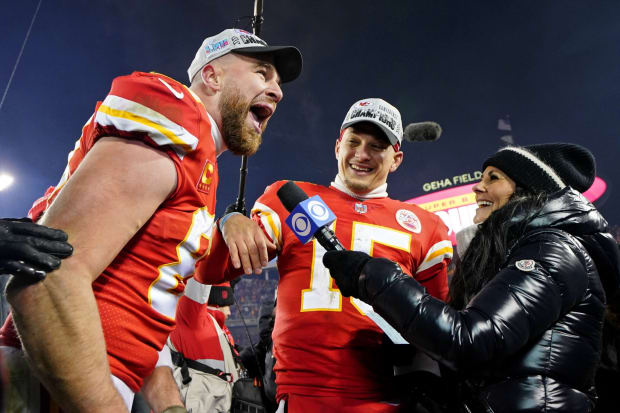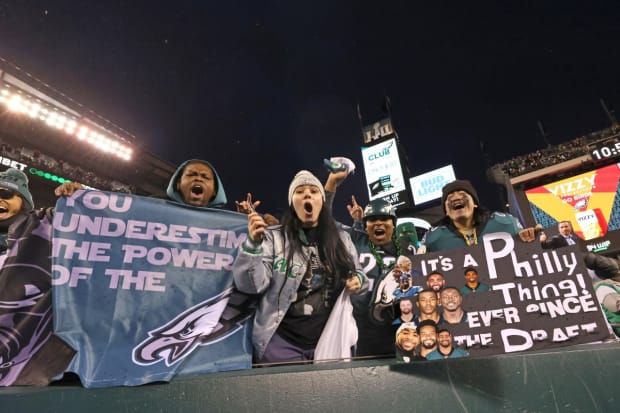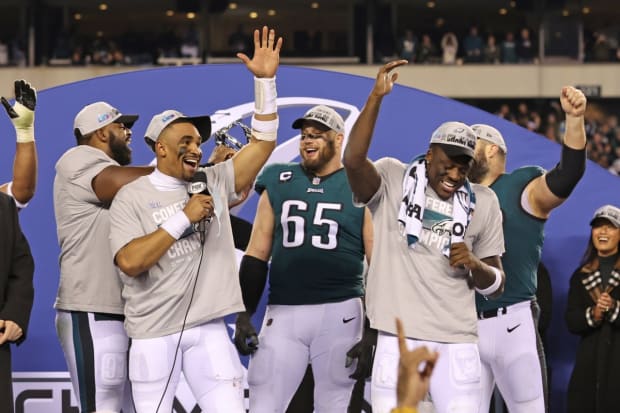Twenty weeks ago, Joe Burrow sat down in front of a live mic on the Colin Cowherd Podcast and offered up a little more candor than most football players exhibit when they discuss the game many of them have dreamed about since they were children.
The Super Bowl, which his Bengals played in last season, felt like a dinner party. He said the event, in Los Angeles’s SoFi Stadium, didn’t feel like a playoff football game after what he had experienced the weeks before in Tennessee and Kansas City. Somehow, the conversation about neutral-site NFL playoff games has only been ratcheted up since then.

Jay Biggerstaff/USA TODAY Sports
The Eagles and Chiefs qualified to face each other in Super Bowl LVII, and two of the lasting scenes from conference championship Sunday took place on podiums in the middle of packed stadiums. First, Jalen Hurts belted out “Fly, Eagles, Fly” to a stadium full of fans celebrating a second Super Bowl appearance in six seasons. Four hours later and 1,000 miles west, Travis Kelce went full WWE on the mayor of Cincinnati, who had chimed in on social media with other Bengals fans who had taken to calling Arrowhead Stadium “Burrowhead” in honor of their QB.
If the NFL gets its way, those scenes may be numbered.
The NFL was in an unprecedented spot after Week 17, when Damar Hamlin went into cardiac arrest on the field, leading to the suspension, and later cancellation, of the Bengals-Bills game. And as everyone rallied around Hamlin in the immediate aftermath, it seemed clear that people would mostly put aside competitive concerns to do what was best for the league. Out of that situation was born the neutral-site AFC title game, but only if the Chiefs and Bills both advanced that far.
Then something happened: The NFL reportedly decided it may want that permanently. At least enough to discuss it. (A league spokesman recently denied it after the speculation had already simmered for two weeks.) The MMQB’s Albert Breer is among the reporters who explored the topic, writing about how money could drive the decision. And when the league smells an opportunity to make money, that usually ends a debate.
But if the NFL really goes down that route, it needs to confront that fact that the decision may be deeply unpopular.
“I feel like if we’ve earned home field advantage throughout the playoffs; we need to keep it that way,” Eagles cornerback James Bradberry told me in the postgame locker room after dismantling the Niners in front of a delirious crowd at Lincoln Financial Field.
“The fans were lit,” he said, describing what the seventh-year player called “probably the loudest stadium I’ve been to up until this point.” The Second-Team All-Pro had played in one career playoff game—for the 2017 Panthers—before joining the Eagles this year. “I don’t think they need to try to put it in a neutral site at all. I need my Philly fans in Philly.”
Running back Boston Scott felt the same way.
“There were a few times where crowd noise had an impact on what the 49ers were doing,” he said after finding the end zone for the second consecutive week. “That’s what you want. You want raucous fans making a whole bunch of noise and having an impact on the game. So that home field advantage is so big.”
He similarly viewed the South Philly setting as a culmination of an entire season’s worth of work.
“People work hard; teams work hard to get to the No. 1 seed. So I think having that advantage, I think they earned that. … I think that’s another goal that you can push toward.”
The sentiment was echoed in both the Philly and Kansas City parking lots.
“People that don’t have a lot of money aren’t gonna be able to go to Arizona to go to the NFC championship game,” said Garrett Hetrick, a 43-year-old Eagles season ticket holder from King of Prussia, Pa., who arrived at 9:30 a.m. to start tailgating.
Even though he says he would have been willing to travel to such a game, he preferred having it more accessible to the local fans. “A lot of people aren’t gonna be able to go to the Super Bowl, so this becomes like your Super Bowl in your home city,” he added.
Watch the NFL with fuboTV. Start your free trial today.
Steve Moose, a 13-year season ticket holder from West Chester, Pa., was more blunt. He would not have gone to a neutral-site NFC title game in Indianapolis or Atlanta or wherever. “I would have been sending nasty emails to the NFL for moving the game,” he said with a grin. “Gotta have the home field advantage.”
Would he feel the same had the Niners earned the right to play Sunday’s game in Santa Clara? “Absolutely. That’s the way it should be.”

Bill Streicher/USA TODAY Sports
This is all anecdotal evidence, though walking through the rows of Eagles tents and cornhole setups, and green jerseys and grills, and Philly themed vans, the viewpoint was easy to find. Mike Florio sent out a poll to Pro Football Talk’s 1.8 million Twitter followers Jan. 20, and 85.4% of the more than 18,000 respondents said they prefer letting the higher seed host the game. This, too, is not done with the rigor of a professional polling outlet, though the number shows an overwhelming dislike of the idea.
Here’s the important thing: If the NFL actually considers the change, players and fans should be high on the list of people the league consults. It would come down to a vote among the owners, and Steelers president Art Rooney II has already said he hates it.
The NFL will always prioritize the tens of millions of fans watching on TV over the tens of thousands attending in person. This is the thinking behind the change for the 2023 season that will allow Monday Night Football to incorporate flex scheduling. Hey, sorry you bought a ticket and a flight four months ago to see the Packers play in Miami on a Sunday afternoon, but ESPN wants a good game. Tell your boss you need Monday and Tuesday off from work now. It sounds harsh, but this is at least understandable—the TV audience is what makes the NFL world go round. But in the case of neutral-site games, we’re not moving a game from one time slot to another to boost ratings. Shifting the location from a home field to a neutral site has an actual impact on the game itself.
In the AFC, the location became the story on championship Sunday. It was the first thing some Chiefs players wanted to discuss after their win. “Burrowhead my ass,” Kelce bellowed to CBS’s Tracy Wolfson, before shouting down the mayor to Jim Nantz (and also everyone in the world). The story line would have been nonexistent if this game and or last year’s—between the same two teams—had been in Atlanta.
This is part of the drama as the NFL tells a story that builds on narratives year after year. Sometimes you have to win in someone else’s house. Think of all those Tom Brady vs. Peyton Manning battles, sometimes outdoors, other times in the dome. Listen to former players talk about getting pumped up for rivalry games in front of either their own fans or the opposition. Eli Manning has been having good-natured fun talking about his experience with the Philly crowd for two years since the ManningCast launched.

ill Streicher/USA TODAY Sports
Eagles fans in the parking lot Sunday were speaking mostly in hypotheticals about whether they’d buy tickets to a neutral-site NFC title game. Chiefs fans have actually had the experience. Tickets for a potential conference title game against the Bills—the only way the game would have been in Atlanta—went on sale the week before the Bills succumbed to the Bengals in the divisional round.
“If they were gonna move that to a neutral site [permanently], which I hate, it’s gonna alienate a ton of people that would come to the game,” said Tony Arnone, a 56-year-old Kansas City native who now makes a nearly three-hour drive to Arrowhead from Bentonville, Ark., for every home game.
Arnone is also the admin for a Facebook group devoted to buying and selling Chiefs tickets that has nearly 15,000 members. So he has his finger on the pulse of what the faithful who pack Arrowhead each week are interested in.
“All the people that tailgate with us, and all the people that sit around us, and my friends that travel up with us on Sundays every week, nobody was going,” he said. “I mean one guy’s like, ’Hey if everyone wants to get in the van, I’ll drive over.’ But nobody was gonna go.”
Arnone himself said he was 50-50. He logged on for the season ticket holder presale opportunity and reserved them, but did so knowing he had friends in Atlanta who would use his tickets if he didn’t.
“I’m not saying nobody was gonna go,” he said. “The stadium would have been full. There woulda been Chiefs fans and Bills fans. But nobody I knew was hopping in a car to go see this game in Atlanta. Or getting flights.”
His list of grievances didn’t stop at the location. “And plus you have two outdoor teams and they gotta play in a stinkin’ dome? I hate dome football. There were just a lot of things I felt were wrong about it.”
David Tyrrell is another Chiefs season ticket holder, who lives in Leawood, Kans., “a nine-iron away from the state line.” He was born and raised in Kansas City and said his grandfather bought season tickets when the team first moved from Dallas and played in the old Municipal Stadium in the ’60s. The tickets have been passed down through the family.
But he similarly bought tickets without knowing whether he’d actually go, saying his parents probably would have used the seats. Because his family has had the seats so long, he was in the earliest wave to buy them when online ticketing opened and was able to get prime seats. “And worst case,” he admitted, “I knew if I had front-row seats, I was gonna be able to get my face value back for them [on the secondary market].”
This is an inherent flaw in the NFL’s touting the success of ticket sales as definitive proof that the idea would work. First, you can’t assume the demand would be this high every year. Some of the ticket buyers surely must have been intrigued by what had the potential to be a one-time novelty. Great teams make conference title games in bunches, as the Chiefs have shown the past five years. Would fans shell out extra cash to fly somewhere new year after year?
And, second, there’s no way of knowing how many people who snatched up the tickets would have actually showed up. Maybe the game would have had an atmosphere like the best Rose Bowl you’ve ever seen. But the experiment was shut off before it fully played out.
Tyrrell went to Super Bowl LIV in Miami, where his Chiefs rallied from 10 points down midway through the fourth quarter to beat the Niners. Burrow called his Super Bowl a dinner party, while Tyrrell likened his more to a sales convention.
“It was an amazing game for them to make the comeback. And I was a little disappointed by how many people there were just on a corporate charter, so to speak. It was very tame, obviously, compared to being in Arrowhead for a game.”
He fears that if the league makes these games a postseason staple, the effect will creep into conference championship Sunday: “Yeah I think it’s gonna get watered down for the fans of those teams. It would not be the same.”
Where Arnone and Tyrrell differ was on their experience with pricing. Tyrrell said his tickets for the actual game against Cincinnati were significantly cheaper than the ones he had reserved in Atlanta. Arnone was surprised to find tickets in Atlanta more affordable than he expected, which he surmised might be the only way they could fill the stadium.
But both agree taking it out of Kansas City, where the tailgate scene is enormous and the fans are full-throttle for every snap, would be a shame.
Meanwhile, the 31–7 final score in Philly meant most of the second half was a party atmosphere, with fans belting out Bon Jovi and Sixers players getting recognized on the jumbotron after playing a home game the day before. Hurts then serenaded a full stadium in an atmosphere Scott called “unmatched,” and then fans poured out of the parking lots and onto Broad Street, greased poles and bus stops be damned.
So much about what makes the NFL popular was on display last weekend. Passionate fan bases grilling meats and slugging beers in the dark of the early morning and then screaming until their cheeks hurt to help their home team maybe draw a false start. Intensity radiating through the TV to millions at home. Hyped players celebrating with their fans and egging them on to poke harmless fun at their opponents.
Is it really worth messing with that formula? To slap a brand name on the game—which they could do anyway? To give a city a Super Bowl trial run? To convince more local governments to fork over public funding for billionaires’ football palaces?
If the NFL is really thinking about chasing a few dollars to risk screwing up a very good thing, the least the folks in charge could do is ask around.







